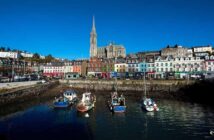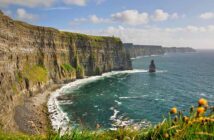
The Minister for Tourism, Culture, Arts, Gaeltacht, Sport and Media, Catherine Martin has published the long awaited new Tourism Policy Framework, just as an election is called.
The document sets out aims of achieving balanced economic, environmental, and social sustainability in Irish tourism through 2030.
The framework includes 61 policy proposals developed after extensive consultations with stakeholders and calls for protecting natural assets, contributing to climate commitments, and ensuring that tourism benefits local communities.
Key guiding principles focus on prioritising economic value per visitor, encouraging innovation in tourism, and minimising negative impacts on host communities, while supporting balanced economic development and job creation.
Minister Martin shared: “This is a very important day for Irish tourism. While our tourism offering remains strong, I want a thriving tourism in 2030 which provides quality employment right across the country. Equally, tourism should play its part in achieving our environmental targets and I am confident that this new Tourism Policy Framework achieves the right balance of economic, environmental and social sustainability.
Tourism continues to play a vital role in Irish life. It is both an essential economic sector and a means by which Ireland tells stories of itself to the world and builds deep and lasting connections with friends around the globe. We can further strengthen our shared island offering to visitors, support rewarding careers, enhance the regional distribution of tourism, grow our food-based offerings for visitors, reduce waste, minimise the environmental footprint of holidays and ultimately ensure Ireland remains a world-class and sustainable destination. I look forward to the tourism agencies, other public bodies and the tourism sector working together to achieve the sustainable growth targets set out in the Policy.”
The full Tourism Policy Framework can be found here
- To ensure that tourism plays its part in achieving national and international emissions reduction targets, a baseline figure for the carbon emissions of the tourism sector will be calculated by Fáilte Ireland. This will require a thorough analysis of current emissions trends and sustainability measures. Subsequent Tourism Action Plans to give effect to the policy objectives outlined in this Framework will contain tourism specific emission reduction targets.
- While recognising the actions being taken across Government to reduce future emissions, significant changes will still be experienced because of climate change. To ensure the tourism sector
- is well placed to deal with these changes and in line with national requirements for sectors which are expected to be significantly impacted by climate change, DTCAGSM will, as a priority, publish a detailed Sectoral Adaptation Plan for the tourism sector.
- There is a pressing need for implementation of effective climate actions across the tourism sector. Accordingly, future industry supports will be designed to take account of climate impact.
- Financial assistance will be prioritised to recipients that can demonstrate commitment to good practice on environment and climate action.
- Through programmes from Fáilte Ireland, SEAI, and other public bodies, the tourism sector will be provided with significant supports to tackle emissions and to report on the outcomes. Key actions will include improving insulation and the energy efficiency of buildings and conversion of heat sources away from fossil fuel energy.
- To allow tourism operators to share their experiences with actions to reduce emissions, a platform will be developed providing case studies and practical guidance on the introduction of GHG reduction measures, including tackling indirect emissions along the supply chain.
- The tourism agencies will review and revise consumer sentiment reporting to include metrics that measure satisfaction with Ireland as a sustainable holiday destination as understanding the expectations and experiences of visitors regarding sustainability is vital to informing the success of environmental measures and policy development.
- Ireland’s natural environment is an essential component of the tourism offering and to ensure it is preserved, DTCAGSM will continue to assess all national policies to ensure they support sustainable tourism and tourism communities. Fáilte Ireland as a designated body under the Planning Acts will input as required to ensure development proposals do not damage Ireland’s habitats and protect the overall quality of the tourism offering.
- Ireland’s biodiversity underpins the overall tourism offering and the quality of life in tourism communities. To enhance Ireland’s biodiversity, guidance and supports will be introduced for tourism businesses on nature-positive measures at tourism facilities such as allowing wildflower meadows to develop; protecting wildlife habitats; and restricting use of weedkillers and pesticides, which can harm habitats and non-target species.
- If planned and managed carefully, tourism can support a net gain in biodiversity quality, providing a benefit to visitors and to local communities.
- The Department will work with local authorities to identify and highlight examples of locations where tourism is contributing to improvements in habitats and a recovery in species numbers. These case studies will be used to inform conservation actions and the careful development of visitor facilities, with a view to growing nature focused tourism.
- The tourism agencies and the Department will work to enable and promote tourist travel to Ireland by ferry and sail/rail initiatives.
- Recognising the importance of aviation to maintaining the tourism sector, the Government will continue to engage at International and EU level and with industry stakeholders to reduce aviation emissions including through the implementation of the Aviation Regulation.
- Increasing the use of public and active transport by tourists is critical to achieving decarbonisation in the sector. The larger tourism attractions will examine the feasibility of using sustainable transport modes and the tourism agencies will explore the development of an online tool to enable decarbonised touring.
- Charging infrastructure is a critical enabler for a successful transition to low-carbon transport modes. The Department will work with the tourism industry and relevant public bodies to accelerate rollout of charging points for electric vehicles and bikes at or adjacent to key sites including visitor attractions, ports, airports, accommodation and on greenways.
- As a shared transport mode, buses offer benefits over private car use, but nonetheless decarbonising Ireland’s private-hire and public transport bus fleet will help to reduce emissions.
- In addition, car rental continues to play a significant role within the sector and so it is important to implement actions to transition to electric vehicles. Complementing plans to decarbonise rail services, Government will work with bus operators and car hire companies to stimulate a switch from fossil-fuel vehicles to electric or other low-carbon options.
- The decarbonisation of inland waterway cruisers will reduce GHG emissions. The Department and relevant agencies will work with the tourism industry to facilitate and market the use of more sustainable fuels in the rental fleets and other boats servicing the tourism sector.
- As food waste is a major cause of GHG emissions it has been targeted as a key climate action. Fáilte Ireland is a signatory of the national Food Waste Charter and will work with the EPA and the tourism industry to implement the objectives of the Charter.
- Relevant agencies will work with the tourism industry to reduce resource consumption and prevent unnecessary waste. Case-studies on avoided product use and waste prevention will be used to highlight best practice for implementation by the sector.
- The tourism agencies will also incorporate metrics on circularity and recycling into any Sustainable Tourism Assurance Programme to ensure a fair and robust reporting of environmental commitment.
- To complement actions by operators on waste prevention, the tourism agencies will work with the tourism industry to develop an engaging and positive awareness campaign for tourists, on their role in water conservation, recycling and reducing food waste
- To ensure Ireland has the appropriate facilities in place to benefit from more active holidaymakers, local authorities and other relevant agencies will continue to progress development of infrastructure such as greenways, blueways, walking trails and active travel routes. A key consideration in the regard will be to ensure that such infrastructure is sustainable and minimises negative impacts on natural capital and built heritage.
- The tourism agencies will also further promote active holidays and outdoor festivals.
- A growing number of Irish communities have implemented coordinated sustainability tourism actions. The tourism agencies will identify these and promote a network map of accredited green tourism communities that can serve as a linked chain of destinations for visitors and act as an exemplar for other towns and villages.
- Recognising the need for enhanced collaboration on environment and climate issues, the Department will develop a process to ensure regular engagement between the tourism sector, bodies mandated to protect Ireland’s natural and built heritage as well as agencies working to enhance environmental sustainability.
- In view of the economic importance of tourism for the Irish economy, the Government is committed to increasing the level of public investment in tourism in real terms for the period of this Tourism Policy Framework and providing enhanced level of funding for sustainability measures.
- While further public funding support will be provided for investment in tourism capital projects over the lifetime of this Policy Framework, priority will be given to projects that ensure a greater regional spread of tourists and projects that can help achieve a longer tourism season in the relevant areas. Fáilte Ireland will develop a capital investment strategy to guide investment in the sector.
- The Government will seek to maintain a healthy and profitable environment for the tourism sector during the lifetime of this Framework. In making any decisions in relation to taxation measures, the impact on the tourism sector will be fully considered and the Government will balance the costs of the measures in question against their impact and the overall budgetary framework. Furthermore, any tax changes required to achieve the objectives of this Policy Framework will be kept under ongoing review and DTCAGSM and the Department of Finance will ensure such measures are considered as part of the annual budgetary process.
- To ensure that the Irish tourism sector remains at the forefront of the digitalisation evolution, the tourism agencies and other relevant stakeholders will develop a digital transition strategy for the sector and continue to support tourism businesses on their digitalisation journey over the lifetime of this Policy Framework.
- In view of the significant expenditure by Irish residents on overseas holidays, the quality tourism product on the island and the environmental benefits of domestic rather than overseas holidays, there will be an increased focus on encouraging people to substitute an overseas holiday with a domestic one and specific marketing funding will be allocated for appropriate campaigns.
- To ensure that Ireland achieves the economic growth targets outlined in this Policy Framework, the Department and the Tourism Agencies will focus marketing efforts on those regions and market segments that have the strongest prospects of revenue growth for lowest carbon footprint.
- To achieve the thriving tourism sector envisaged by this Policy Framework, it will be a priority of Government that all relevant accommodation currently being used for humanitarian purposes will be returned to use for tourism purposes.
- To ensure that accommodation is available in all areas capable of growing tourism numbers in a sustainable manner, a Tourism Accommodation policy will be produced to guide the development of the right blend of accommodation options in all areas.
- New legislation will be enacted to provide the statutory basis for the establishment of a register for short term lets in Ireland and for the implementation of the EU Short Term Rental Regulation as adopted by the EU on 11 April 2024. In parallel with this, the Department of Housing, Local Government and Heritage will develop Planning Guidance for the Short Term Letting sector to provide clarity and certainty on the planning requirements in respect of Short Term Letting properties. This will allow the tourism sector to develop in a way that recognises and is complementary to the wider needs of local communities, both economically and socially.
- To realise the full potential of business events, a collaborative and coordinated whole of Government approach will be taken to the on-going development of the Irish business events industry, in line with Ireland’s Business Events Strategy, for the delivery of increased value for tourism and beyond.
- The hosting of major sporting events can provide a significant tourism boost to the host country. To ensure a more strategic method of deciding which major events Ireland should bid for, the The Department will finalisepublished a new Major International Sports Events Strategy.
- The new Major Events Strategy will align with Policy in October 2024 and decisions on which major sports events to pursue will be based on this and the policy objectives ofset out in this Tourism Policy Framework including sustainability considerations.
- Fáilte Ireland will develop a revised investment strategy for festivals and will provide opportunities for new festivals to join the Fáilte Ireland portfolio and avail of multi-annual funding. The strategy will aim to support, develop and deliver a diverse and compelling portfolio of uniquely Irish tourism-led festivals. These festivals will make a more sustainable contribution to Ireland’s economy by motivating not only incremental international visitors but also domestic audiences to attend and stay longer in the destination.
- Ireland’s world-class food and drink products provide a strong basis for developing food-based experience tourism. Working with industry, the tourism agencies, will establish campaigns based on regional food trails that highlight strong local specialities.
- Nature based tourism represents a significant growth opportunity and accordingly, the tourism agencies will explore other high- potential sustainable themes for development with appropriate support and marketing.
- The need to spread the benefits of tourism to all regions will be a priority consideration for all public investment decisions. Regional Tourism Development Strategies will be activated through a series of Destination and Experience Development Plans and public realm improvements.
- The Destination Towns Scheme and the Destination Experience Development Plans (DEDPs) will be expanded during the lifetime of this Policy Framework and the tourism agencies will work with industry to develop itineraries and packages to keep visitors within regions for longer.
- To ensure the continued growth of tourism in the regions over the lifetime of this Policy Framework, there will be continued prioritisation of developing and promoting access to regional ports and airports, with associated marketing support provided by the tourism agencies.
- The Department and Fáilte Ireland as the intermediary body, will work closely with other State agencies and private stakeholders to ensure that all projects in receipt of EU Just Transition Funding are delivered by 2026.
- In terms of delivering a high quality, sustainable tourism offering, all learnings gleaned from the Just Transition Projects will be fully factored into the design of future public funding schemes for tourism projects.
- To ensure a more sustainable tourism industry that benefits the entire community, the need to extend the tourism season will be a priority consideration for all public investment decisions. The tourism agencies will have an enhanced focus on marketing the off-peak season and will ensure that support for festivals and tourism infrastructure prioritises initiatives that can address seasonality concerns.
- To ensure areas grow in a sustainable manner, the tourism agencies will continue to implement DEDPs. Actions to bring social and economic benefits to host communities will be a key consideration in these plans. Local authorities will also monitor the social and environmental impact of high volumes of tourists in popular areas, to ensure there is not an excessive burden on host communities and their local environment. In line with international experience, the potential for introducing appropriate measures to manage visitor numbers at peak times will be kept under review.
- Interactions with capable and courteous staff at tourism businesses underpin visitor satisfaction. Quality and diverse employment practices will be promoted and championed through a strengthened Employer Excellence Programme led by Fáilte Ireland, with the support of the Department and the tourism industry.
- To ensure a continued coordinated and efficient approach to address labour shortages, the Department will work with industry and across Government on key issues, such as processing work permits for priority occupations.
- The Department will work with other relevant Departments, agencies, representative bodies and education providers to continue the work of the Hospitality and Tourism Careers Oversight Group, established to address labour supply and skills development issues for tourism businesses.
- To harness the growing, high value inclusive tourism market the Government will work with the tourism agencies to establish Ireland as an internationally recognised accessible and inclusive tourism destination.
- The Government will work with the tourism agencies to ensure that visitors enjoy their holiday without fear of discrimination because of sexuality, race, gender or ability. This will be reflected in the development and promotion of attractions, events and facilities.
- Providing for universal accessibility is fundamental to extending the Irish welcome.
- To ensure all tourists can enjoy Ireland’s tourism offering, the tourism agencies will work with the industry and advocacy groups to identify and address barriers and issues that can restrict access to tourist sites and services.
- The Government is committed to ongoing cooperation in the overseas marketing of the island of Ireland as a holiday destination. In this regard, the Government will work with counterparts in Northern Ireland to ensure that Tourism Ireland continues to be adequately resourced to successfully carry out its remit and help achieve the policy objectives set out in this Policy Framework.
- Under the Strategic Coordination Group on Tourism, established by the North South Ministerial Council, the Department and tourism agencies will work with counterparts in the north to harness the tourism potential of the whole island offering rewarding experiences for visitors, while supporting communities across the island. The coordination group will also explore all funding opportunities, such as Shared Island and Peace Plus to invest in the development of sustainable tourism infrastructure on the island.
- Encouraging two-way flows of tourists between the South and the North can potentially benefit both economies as well as having a positive environmental impact when substituted for an overseas holiday. Accordingly, the tourism agencies North and South will work together to further develop appropriate opportunities across the entire island.
- To achieve the sustainable growth targets set out in this Policy Framework, the Department will continue to work with the Department of Justice to ensure access requirements are as streamlined and efficient as possible.
- The tourism agencies and, local authorities and other relevant agencies will collaborate to develop new defined routes at regional-scale based on heritage themes. An examination of additional opportunities to present Ireland’s arts, cultural heritage and the Irish language to visitors in a manner consistent with the objectives of this Policy Framework will also be undertaken.
- The Department and the tourism agencies will work with relevant sporting bodies to maximise tourism opportunities associated with our unique sporting heritage.
- Ireland’s night-time economy represents a significant part of the overall tourism offering. The Department, the tourism agencies and other relevant stakeholders will continue to progress the recommendations of the Taskforce Report and ensure that Ireland’s night-time economy is recognised as being amongst the best in the world and a real asset in terms of attracting overseas visitors and visitors from across Ireland. Work will continue to support the various pilot projects including the NTE Advisors across the country to drive a more sustainable and diverse night-time offering.




